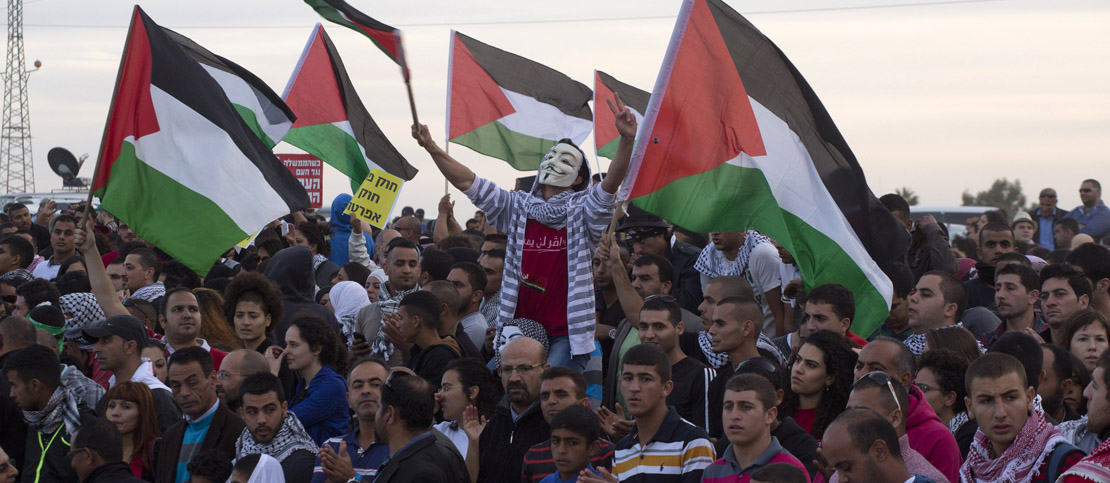To most Jewish Israelis they don’t have names or faces — they are at worst rioters and stone-throwers waving Palestinian flags; at best they are a discriminated-against minority.
Their new activism is partly the result of generational divides and new technologies that have connected them to the rest of the Arab world that had been shut off since the birth of the State of Israel. In part it is the result of recent Israeli attacks against their relatives in the West Bank and Gaza, discriminatory police violence and a long history of political repression.
No small number of factors has helped shape this new generation of Palestinian activists in Israel. They go by different names, define different identities for themselves and have different political tactics and goals. They fight for Palestinian national liberation and Israeli civil rights, prioritizing each based on strategic and tactical considerations, and have varying approaches to mainstream politics.
Most of the young activists describe themselves as Palestinian, and when they take to the streets they wave the Palestinian flag, something that was almost unheard of in previous generations inside Israel. Their national identity and its expression, however, are greatly influenced by living in the Jewish state.
“The first time my father saw me carrying the Palestinian flag, he lost his mind,” says Abed Abu Shhadeh, 26, from Jaffa. “Before Oslo it was illegal to do that, and Palestinians would have been extremely afraid of the flag. Today, we have dozens of them.”
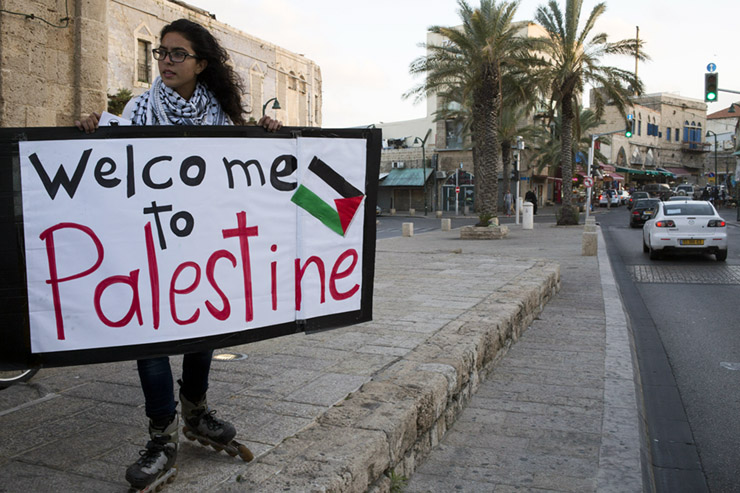
Technically, the flag of the Palestinian Liberation Organization is illegal to display in Israel, and the PLO is still listed as a terrorist organization. In practice, that prohibition hasn’t been enforced since Israel began dealing directly with the Yasser Arafat and the PLO in the 1990s. Much has changed.
This is the third generation of Palestinian citizens of Israel. The first generation experienced the Nakba, the displacement and expulsion of the majority of Palestinians from the borders of present-day Israel in 1948, along with the destruction of nearly all of their villages. The second generation was raised in fear: they were raised by survivors of the Nakba, lived under Israel’s military government and were constantly threatened and controlled by the State, Rawan Bisharat explains.
“The third generation, especially since the Intifada of 2000, is the generation that is rebelling. They are characterized by strength,” she continues. But often times their parents tried to reel them back in. Because of the oppression faced by the previous generation, they are scared by their children’s political expression and its consequences. “They don’t want us to discuss Palestinian national identity with their children, out of fear.”
Rawan, 32, originally from Nazareth, has been living in Jaffa for the past five years, where she is active in political and social movements. She is the Palestinian coordinator of the youth program at Sedaka-Reut, a non-profit focusing on educating Palestinian and Jewish youth to be politically and socially active and on creating bi-national partnerships for social change. She has volunteered with an organization called “Women Against Violence” in Nazareth for over a decade, and works with a group preparing Arab high school students for higher education. “As a Palestinian minority, education is our weapon,” she declares.
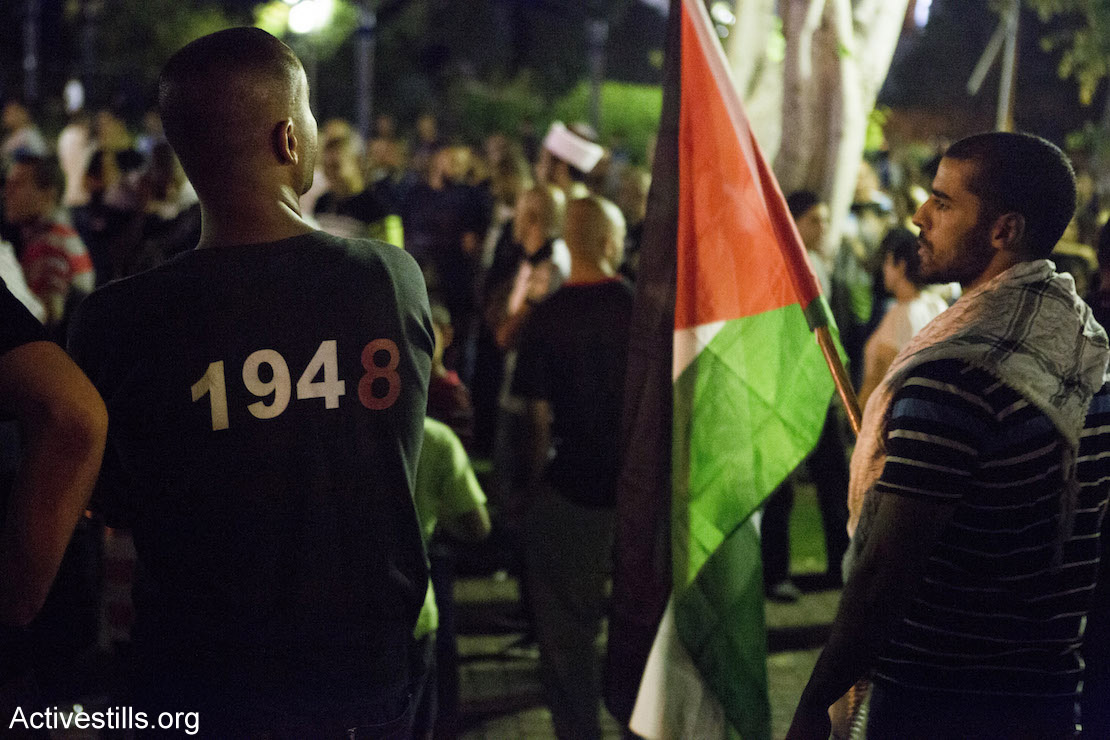
Arab-Israeli or Palestinian-Arab: A struggle for identity
While all of the activists I spoke to define themselves as Arab, all of them also put great importance on their Palestinian identity — something that is not self-evident, and which most feel the need to demonstrate and declare.
“Palestinians in Ramallah can say they’re Palestinian and khalas – nobody questions it. But for Palestinians in Israel, we have to stress that component,” Rawan says, adding that when she speaks to Israelis, “I like to say that I’m a ‘48 Palestinian, or a Palestinian with Israeli citizenship, to clarify that there are Palestinians here [in Israel]. There was never a Palestinian state, but Palestinians lived here. My grandmother was Palestinian, and so I am clearly Palestinian.”
Palestinian identity is the fulcrum of this generation’s struggle, explains Hanin Majadli, 25, from Baqa al-Gharbiyye, who has built a sizable Jewish-Israeli fan-base of sorts on Facebook, where she publishes daily Arabic lessons. “We are Palestinians; we are Palestinians who are prevented from self-identifying as such. It’s important for me that Israelis know that I’m not only an ‘Arab-Israeli’ but an Arab-Palestinian. This is a nationality they are trying to obscure.”
Society has come to a point where you can’t even think of an Arab-Jewish coalition.Abed Abu Shhadeh
In many ways, the growing expression of Palestinian national identity among Arab citizens of Israel is a reaction to contemporary Zionism. As Israeli politics and society shift rightward, Palestinian citizens grasp onto their Palestinian heritage and nationality ever more tightly. According to Abed, far-right nationalist politicians like Avigdor Liberman and Naftali Bennett actually help boost the Palestinian national minority in Israel.
“The crazy laws being passed in the last few years affect people and the way they identify themselves. It’s amazing how a very small group in Israeli society managed to pull everyone to the extreme right,” Abed says, explaining that by everyone, he is also referring to Palestinians.
Even those who wouldn’t otherwise be drawn to Palestinian nationalism embrace it as a defense against the parallel radicalization and intensification of Zionist nationalism, Hanin explains. “I experience the need to hold onto who I am. Palestinians today feel a greater need to stress that they are Palestinian.”
“Just like Hamas, extreme-right religious Jews really believe this is a religious struggle, and in a short period of time they have managed to pull everyone toward the extreme right. Society has come to a point where you can’t even think of an Arab-Jewish coalition. We’ve been pulled so far apart from each other that we can’t even cooperate,” Abed stipulates.
Activism as a product of failed politics
Those same cleavages between Jews and Arabs and the resultant cohesion among them also play out in politics, most recently evidenced by the formation of the Joint List of Arab parties running together in Israel’s upcoming elections. Along with whatever hope the Joint List brings, however, it must deal with a legacy disappointment.
The political organizing and the existence of Arab political parties in Israel is important, Rawan says, but they are unrepresentative of the younger generation and its worldview. “The politicians need to be replaced. Thank you for your hard work, but it’s time to give others a chance.”
To some of these young Palestinians, Arab Knesset members might as well be ornaments on the shelf displayed alongside the Palestinian flag; their presence is merely symbolic.
“Their role is more declarative, rather than as agents for actual change,” explains Majd Kayyal, 23, a journalist and activist from Haifa. The presence of Arab representatives in the Knesset strengthens the existence of political parties and maps out the Palestinian political reality, which is important. “It grants them access to vital information that we are in need of. The transformation that they go through in the Knesset is also important. When they are suddenly silenced, or forced down the podium, it’s a reflection of what’s going on in Israeli society as a whole.”
Despite the festive atmosphere surrounding the Joint List, the younger generation is not compromising; it has high expectations. “There are issues substantial to Palestinians: the return of refugees to their villages, Zionism as a racist, colonial movement, and the inherently racist definition of the state. If the Joint List ignores these and other critical issues, it will become nothing more than a technical channel with access to the Knesset,” Majd adds.
Hanin reaffirms Majd premise: “I generally don’t believe that any change will come out of the Knesset. I don’t believe that the Arab members of parliament are in a position to really change our situation.”
Without a dominant personality taking the lead, these young activists have learned to rely on nobody but themselves to bring about the change they believe they deserve, which primarily bolsters their faith in power of the people. However, not having a dominant, effective leadership has its consequences. Without a central power base, much of their activism takes place without proper coordination or specific demands.
“I do not think there is an organized goal for the future and this is where the problem lies. As Palestinians, we’re not organizing ourselves,” Rawan laments. “These are problems that we have to work on internally.”
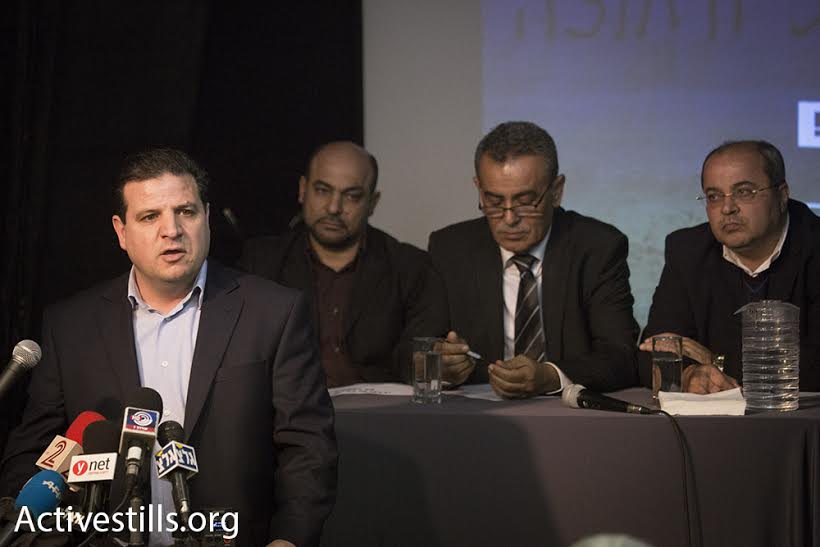
The Joint List
The announcement of the Joint List brought winds of hope, and softened many of the younger generation’s sharp stances towards their political leaders. Many view this as an historic moment. Calls to boycott the elections have been replaced with the potential for change promised by the Joint List.
“Before the Joint List was announced, I was against the elections. I was personally going to boycott, even though individual acts of boycott don’t really affect a change,” Rawan reflects in a follow-up interview following the announcement of the Joint List.
“I am going to vote for the List, not only because their decision to unite is encouraging, but also because I honestly fear that our interests won’t make it past the [election] threshold,” explains Hanin. “For me voting is just another tool for fighting the repressive Israeli regime. I might not get much through voting, but I could make their lives harder and expose this fake democracy, which is actually based on religious supremacy,” adds Abed.
By no means does unity conceal some of the very basic and inherent internal differences among the parties, but what Palestinians in Israel understand is that a united front is necessary if any progress is to be made on issues concerning them. “While the Arab world is being divided into religious groups and tribes, we are uniting,” Abed says with pride.
This new political unity, like the new generation of activists witnessing it, is undoubtedly a product of changing times.
Most of those with whom I spoke pointed to the past 15 years as a point of departure for Palestinian citizens of Israel, a markedly new era — both in the way the State views and treats them, and how their generation began standing up to those challenges.
October 2000, Intifada and the Arab world
But something changed in the year 2000. The Oslo peace process of the 1990s gave people hope for a better future, a future of Palestinian national self-determination and for Palestinian citizens of Israel, a future of equal rights and opportunity.
In early October of 2000, coinciding with the failure of the peace process and the start of the Second Intifada, Israeli police killed 13 Arab citizens while breaking up protests in Nazareth and throughout the Galilee.
The killings verified the Palestinian minority’s worst fears: no matter what they did, or how much they were willing to compromise, they would always be treated as second class citizens, simply because they are Arabs.
“The Intifada of 2000 is when everyone experienced a change,” Rawan says. “The political awareness was very evident, and it was clear that we [Palestinians] are all related to one another. On the one hand we have a rise in political awareness, and on the other hand we have a loss of hope in Israeli institutions.”
“Every war and intifada, when people in Jaffa watch the news, they don’t see random people in the streets of Ramallah, they see their relatives in the West Bank or Gaza,” Abed adds. These young activists feel inseparably part of the entire Palestinian people, and that their fates are intertwined.
Yes, I live in a Jewish state, but I’m not Jewish, so I’m not a normal citizen.Hanin Majadli
The year 2000 is also cited as an imperative point in the history of Palestinians in Israel for other reasons. Being largely cut off from the rest of the Arab world up until then, technological progress allowed Palestinians in Israel to reconnect with other Arabs in the region.
“With the introduction of satellite television and the internet as new channels of communication, there was an increase in awareness, in knowledge,” explains Majd Kayyal. “This brought about greater opportunities for sharing information, as well as greater activism. Something began to move since October 2000. People became more impudent, in a positive sense. Several movements became less idle, less afraid.”
Last year, Majd was arrested and held incommunicado for five days upon his return from Beirut where he attended a journalism conference. His visit to Lebanon and his subsequent arrest, was a flag of resurgent pan-Arab Palestinian identity, waved by many Palestinian citizens of Israel.
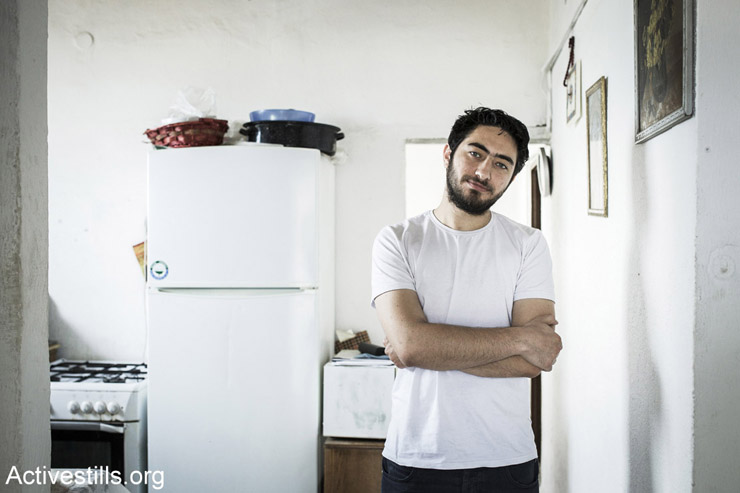
“Our identity is defined according to our struggle. We are Arab Palestinians. We want to be free Palestinians in order to be Arabs. We want to be free Palestinians so that we can naturally integrate in the Arab world without being disgraced one way or another; so that I can have the opportunity to leave the city and easily live in Cairo, for example, without any headaches,” Majd continues. “The Palestinian identity is crucial for this, just as the Arab identity is needed in order to confront colonialism. The Arab identity, if it weren’t to resist Western, European colonialism, would also become fascist, very much like Saddam Hussein’s regime.”
But identity is neither binary nor a simple idea, whether in the realm of the personal or the political. While these young activists increasingly identify with the Palestinian national movement, they are also Israeli citizens and are struggling for civil rights inside the Jewish state. The idea and reality of being a non-Jew in the Jewish state is a major part of that struggle.
“We are not Israelis,” Hanin says. “We are not Israelis in the most basic sense: the Israeli is Jewish, and the Jew is Israeli. In my opinion the two are synonymous. Israeli is considered a nationality here, and not only a citizenship. Our nationality is Palestinian, and we are a part of the Palestinian people. Yes, I live in a Jewish state, but I’m not Jewish, so I’m not a normal citizen. I am an Arab citizen in an occupying state with a Jewish national identity.”
A struggle for civil rights or national liberation?
So what are young Palestinian Israelis demanding, exactly? Are they leading a civil rights movement or are they part of the Palestinian national struggle?
“I don’t separate between the two nor do I see how they differ from each other,” Rawan answers. “I live here, I want to be a part of this institution and I also want civil equality, but that doesn’t mean I have forgotten the Palestinian cause. I want the Jews to acknowledge the crimes they committed against my people. There is no contradiction: I want them to recognize their wrongs, take responsibility for their actions and make them right, and I also want them to grant me the equality I deserve.”
Hanin elaborates: “The end goal is total liberation from Zionism, but of course any temporary steps taken to improve our status as Arab Palestinian citizens of Israel are welcome. We shouldn’t forget that, despite our long-term goal, we are also citizens of this place, and we want to claim what we deserve as citizens as well.”
Zionism is perceived to be the primary obstacle, both for attaining civil rights, and for achieving freedom for the occupied and besieged Palestinians, Majd explains: “As long as the current political structure remains in place we cannot achieve our civil rights, national independence, or a state within 1967 borders — nothing. As long as there is something called a ‘Jewish state’ built on the foundation of racist, Zionist principles, there is no prospect for change of any kind. No matter how ‘small’ your demands may be, you won’t be able to achieve any progress for Palestinians if that matter remains unaddressed.”
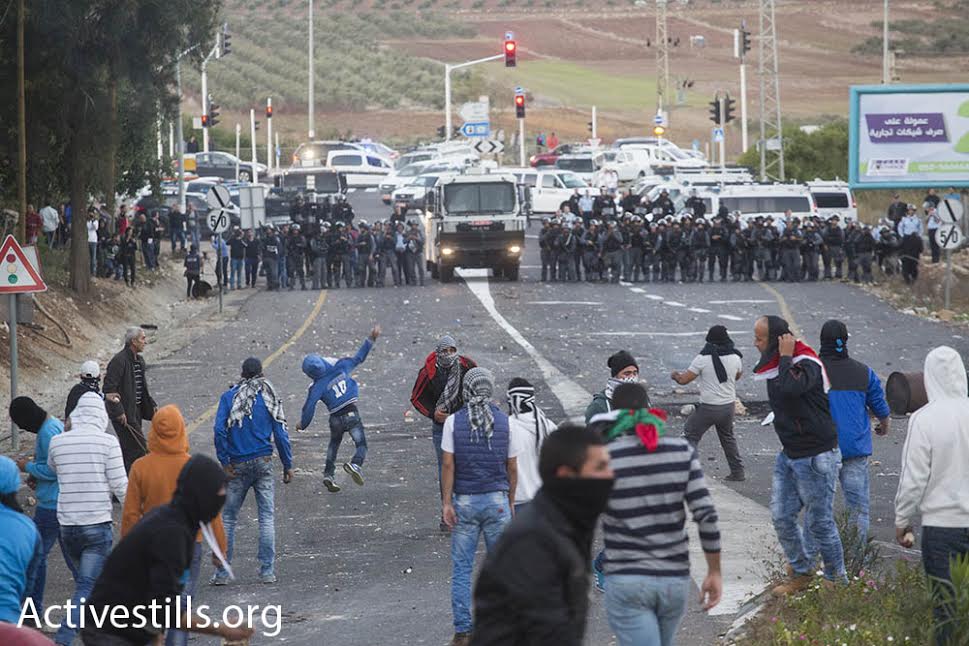
The end game
“When people talk about the conflict, it’s as if they are talking about a conflict between two equal parties,” Abed says. “In reality, one party is significantly stronger than the other, not to mention occupying them and confining them without any space to maneuver political.” Part of protesting and taking to the streets, he adds, is getting Jewish Israelis to “rethink their views about Palestinian citizens, and start to understand that more power won’t get them anywhere.”
While the majority of these activists aspire to change the regime entirely, they operate on an ad hoc basis, and their struggle has no clear vision for the future. “Our ambition is to live in one state where citizenship grants equal to Jews and Arabs, and which doesn’t prefer one over the other or distinguish between Arab and Jew. It might sound a little insane, but if the Berlin Wall was destroyed, and the Ottoman Empire fell after 700 years, then there is hope. Either we do nothing, because nothing is going to change. Or we do something, and believe that it might change things even slightly,” says Hanin.
Rawan even suggests structural ethnic separation as a possible solution: “I think that we as a Palestinian minority in Israel have to start establishing our own organizations and institutions to serve us. We’re still not ready to take on a project like this, and perhaps we don’t have the skills or resources yet, but we at least have to start thinking in this direction.”
“Things might get worse or better. This is something we Palestinians tend to forget – national struggles tend to take hundreds of years. I don’t see a solution in the next 10 years, but as long as there is a will, there is a way,” Abed says. “As long as refugees still want to come back and fight, it is only a matter of time until they do.”

